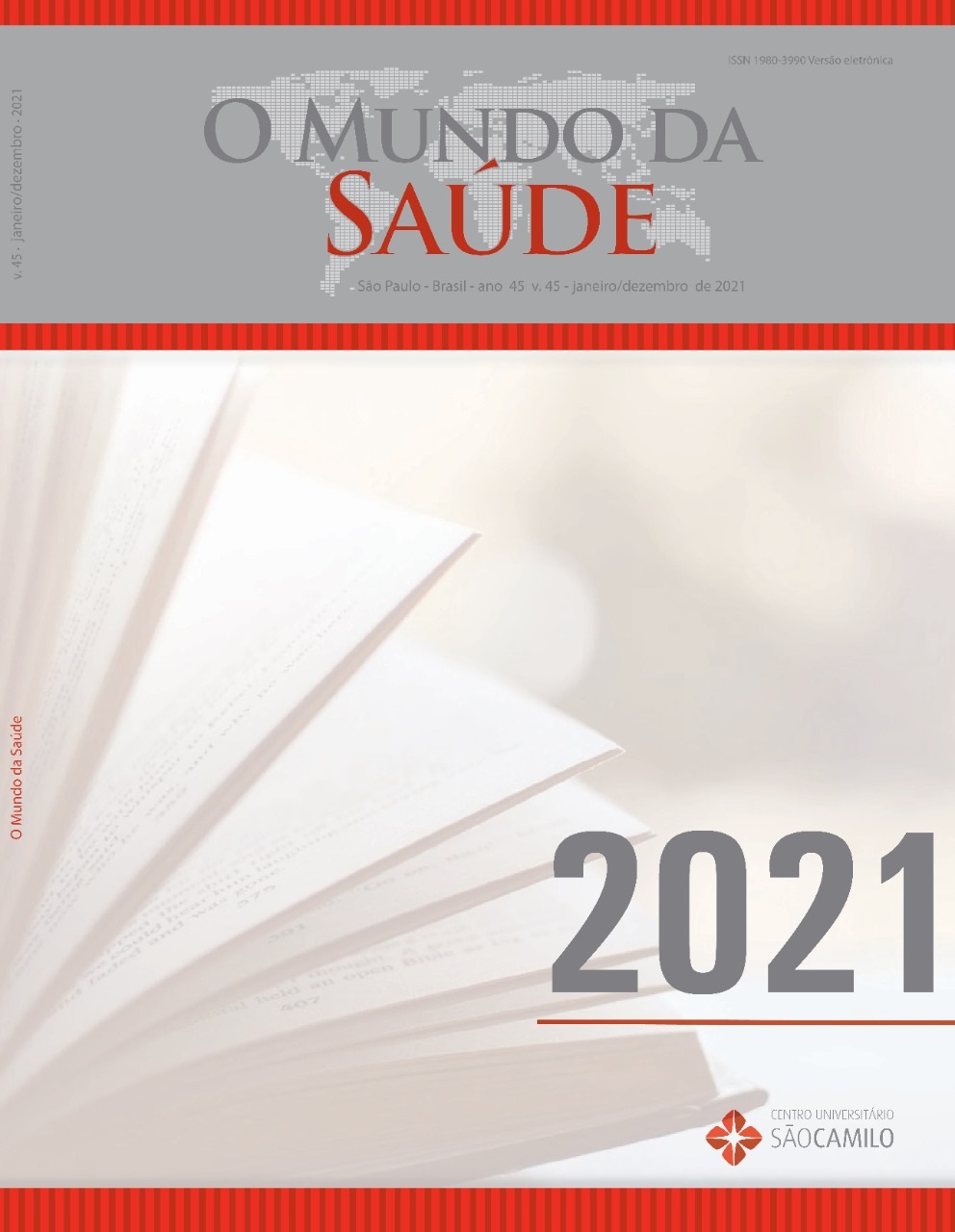Association between concern about falling and depression symptoms in cognitively impaired older adults: a cross-sectional study
DOI:
https://doi.org/10.15343/0104-7809.202145436443Keywords:
Cognitive impairment, Depression, Falls, Physical performance, Older adultsAbstract
Concerns about falling and depressive symptomatology are well-known fall-risk factors in older people. However, whether both factors are inter-related it is not fully elucidated among individuals with cognitive issues. To shed light in this field, we analyzed the association between the concerns about falling and depressive symptoms in older adults with cognitive impairments. This cross-sectional study was composed of 67 community-dwelling cognitively impaired older adults(age: 71±5 years; sex: 78% female). We assessed their concerns about falling (independent) and depression symptoms (outcome) using the Falls Efficacy Scale - International (FESI) and the short-version of Geriatric Depression Scale (GDS-15), respectively. Covariates included age, sex, education, fall history, physical (Short-Physical Performance Battery), and cognitive function (Brazilian version of Montreal Cognitive Assessment). Linear regression models were performed in order to examine the independent relationship between FESI and GDS scores. All analyses were computed using STATA and significance was set at P<0.05. Participants with higher depressive symptoms (GDS ≥ 5 points) showed a significantly poor score on FESI (Mean difference: -5.3 points; 95%CI = -9.9 to -0.7; p=0.02). The regression model showed an association between the FESI and GDS-15 after adjustment for confounders (β=0.08; 95% CI= 0.02; 0.14), suggesting that higher concerns about falling are associated with higher depressive symptoms. Concerns about falling are associated with depressive symptoms among cognitively impaired older adults independently of overall physical function, global cognition, and fall history.
Downloads
References
2. Lord SR, Delbaere K, Sturnieks DL. Chapter 10 - Aging. In: Day BL, Lord SR, editors. Handbook of Clinical Neurology. 159: Elsevier; 2018. p. 157-71.
3. Pimentel WRT, Pagotto V, Stopa SR, Hoffmann M, Andrade FB, Souza Junior PRB, et al. Falls among Brazilian older adults living in urban areas: ELSI-Brazil. Rev Saude Publica. 2018;52Suppl 2(Suppl 2):12s.
4. Liu-Ambrose TY, Ashe MC, Graf P, Beattie BL, Khan KM. Increased risk of falling in older community-dwelling women with mild cognitive impairment. Phys Ther. 2008;88(12):1482-91.
5. Delbaere K, Kochan NA, Close JC, Menant JC, Sturnieks DL, Brodaty H, et al. Mild cognitive impairment as a predictor of falls in community-dwelling older people. Am J Geriatr Psychiatry. 2012;20(10):845-53.
6. Montero-Odasso M, Speechley M. Falls in Cognitively Impaired Older Adults: Implications for Risk Assessment And Prevention. J Am Geriatr Soc. 2018;66(2):367-75.
7. Friedman SM, Munoz B, West SK, Rubin GS, Fried LP. Falls and fear of falling: which comes first? A longitudinal prediction model suggests strategies for primary and secondary prevention. J Am Geriatr Soc. 2002;50(8):1329-35.
8. Murphy SL, Williams CS, Gill TM. Characteristics associated with fear of falling and activity restriction in community-living older persons. J Am Geriatr Soc. 2002;50(3):516-20.
9. (WHO). WHO. Depression and other common mental disorders: global health estimates. World Health Organization. World Health Organization. 2017.
10. Iaboni A, Flint AJ. The complex interplay of depression and falls in older adults: a clinical review. Am J Geriatr Psychiatry. 2013;21(5):484-92.
11. Drummond FMM, Lourenço RA, Lopes CS. Incidence, persistence and risk factors of fear of falling in older adults: cohort study (2008-2013) in Rio de Janeiro, Brazil. Rev Saude Publica. 2020;54:56.
12. Cavalcante BR, de Souza MF, Falck RS, Liu-Ambrose T, Behm DG, Pitangui ACR, et al. Effects of Resistance Exercise with Instability on Cognitive Function (REI Study): A Proof-Of-Concept Randomized Controlled Trial in Older Adults with Cognitive Complaints. J Alzheimers Dis. 2020;77(1):227-39.
13. Cavalcante BR, Souza MF, Liu-Ambrose T, Behm DG, Pitangui ACR, De Araújo RC. Effects of Resistance Exercise with Instability on Neurocognitive Functions (REI STUDY): Study Protocol for a Proof-of-Concept Clinical Trial in Older Adults with Subjective Cognitive Complaints. Motriz: Revista de Educação Física. 2019;25(2):1–8.
14. Memória CM, Yassuda MS, Nakano EY, Forlenza OV. Brief screening for mild cognitive impairment: validation of the Brazilian version of the Montreal cognitive assessment. Int J Geriatr Psychiatry. 2013;28(1):34-40.
15. Lawton MP, Brody EM. Assessment of Older People: Self-Maintaining and Instrumental Activities of Daily Living1. The Gerontologist. 1969;9(3_Part_1):179-86.
16. Lino VT, Pereira SR, Camacho LA, Ribeiro Filho ST, Buksman S. Cross-cultural adaptation of the Independence in Activities of Daily Living Index (Katz Index). Cad Saude Publica. 2008;24(1):103-12.
17. Guralnik JM, Simonsick EM, Ferrucci L, Glynn RJ, Berkman LF, Blazer DG, et al. A short physical performance battery assessing lower extremity function: association with self-reported disability and prediction of mortality and nursing home admission. J Gerontol. 1994;49(2):M85-94.
18. Almeida OP, Almeida SA. Reliability of the Brazilian version of the abbreviated form of Geriatric Depression Scale (GDS) short form. Arq Neuropsiquiatr. 1999;57(2b):421-6.
19. Camargos FF, Dias RC, Dias JM, Freire MT. Cross-cultural adaptation and evaluation of the psychometric properties of the Falls Efficacy Scale-International Among Elderly Brazilians (FES-I-BRAZIL). Rev Bras Fisioter. 2010;14(3):237-43.
20. Franzén E, Conradsson D, Hagströmer M, Nilsson MH. Depressive symptoms associated with concerns about falling in Parkinson's disease. Brain Behav. 2016;6(10):e00524.
21. Hoang OT, Jullamate P, Piphatvanitcha N, Rosenberg E. Factors related to fear of falling among community-dwelling older adults. J Clin Nurs. 2017;26(1-2):68-76.
22. Sherrington C, Fairhall NJ, Wallbank GK, Tiedemann A, Michaleff ZA, Howard K, et al. Exercise for preventing falls in older people living in the community. Cochrane Database Syst Rev. 2019;1(1):Cd012424.
23. Santos P, Cavalcante BR, Vieira A, Guimarães MD, Leandro Da Silva AM, Armstrong ADC, et al. Improving cognitive and physical function through 12-weeks of resistance training in older adults: Randomized controlled trial. J Sports Sci. 2020;38(17):1936-42.
24. Hull SL, Kneebone, II, Farquharson L. Anxiety, depression, and fall-related psychological concerns in community-dwelling older people. Am J Geriatr Psychiatry. 2013;21(12):1287-91.
25. Payette MC, Bélanger C, Léveillé V, Grenier S. Fall-Related Psychological Concerns and Anxiety among Community-Dwelling Older Adults: Systematic Review and Meta-Analysis. PLoS One. 2016;11(4):e0152848.






























